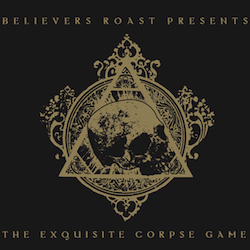Kavus Torabi is a man of many bands and guises, whose psychedelic math-rock roots in The Monsoon Bassoon and intense progressive-pop orchestrations of his Knifeworld project, through his work with Cardiacs, Chrome Hoof and Guapo and more recently with Daevid Allen on the forthcoming Gong album, make him an ideal candidate to captain a project such as this.
Taking its name from the Surrealist version of the game of Consequences, The Exquisite Corpse Game juxtaposes the individual compositions of 13 artists, each conceived in isolation bar for a 20 second fold of the preceding piece, together into a surprisingly satisfying whole. Beyond the stipulation that each fold should be a response to the previous 20 seconds they had been provided with and be of a length between one and four minutes long, each musician was permitted complete artistic freedom.
That the project works as well as it does is as much of a vindication of the hand of chance in the overall proceedings as of the hand that picked the artists involved to begin with. In fact, the pieces flow so well (and seemingly in two distinct groupings that would suggest if this were a piece of vinyl, side A and side B) that one wonders if a conscious design were imposed upon the order in which the artists appeared, or whether it was left to the more powerful, yet inherently random, forces of the subconscious mind.
The opening track from ex-Knifeworld drummer and oud player, Khyam Allami, immediately establishes a high standard for the compositions to follow with a backwards reverberating pulse and contemplative strumming that evokes an eastern-tinged mysticism acting as a complimentary counterpoint to Torabi’s piece, which follows two tracks later. In between those two, Richard Wileman’s ‘Karda Estra’ track evokes a ritualistic interior space as vast a cathedral with skeletal guitar and sinister, yet beautiful organ-like chords and angelic vocal.
Unsurprisingly JG Thirlwell furthers the darkening mood with an initially subtle orchestration that becomes more insistent with the introduction of a martial beat before briefly becoming a fully fledged cinematic battle scene soundtrack. Torabi’s track, a clear standout on the album, reflects aspects of his Iranian ancestry as Allami’s does his Iraqi/Syrian background. It also calls to mind Gravity-era Fred Frith, with its warm, hypnotic riff and off-beat handclaps. While at this point the overall mood of the music is predominantly dark, Torabi’s track walks a fine line maintaining this whilst introducing a deliriously upbeat, hopeful motif. The ex-Oceansize duo of Mike Vennart and Richard A Ingram contribute a considerable chunk of epic ambience with their track as British Theatre. Thinking Plague/5uus drummer/bass player, multi-instrumentalist and renowned producer Bob Drake throws a mournful spanner in the works with a droning viola and a subtly resonating piano chord. Weasel Walter’s track, noticeably the only one to really develop the 20 second fold taken from the previous piece, is a real high point which mutates through many stylistic phases during its four minute duration.
Of course, on an album like this, not every track is going to appeal to everyone and there are at least a couple that don’t quite work for me. Considering the broad sweep of genres that appear on this album, that’s surely part of the attraction. How often can you say you are listening to an Avant rock / Rock in Opposition / World Music / Electronic / Dubstep / Folk / Classical / Kosmische / Minimalist compilation? ‘Side B’ explores the more electronic, folk and cosmic aspects of the equation, with excellent contributions from Laurie Osborne (one time bass player of the Monsoon Bassoon) under his Appleblim moniker and Max Tundra. Former Dark Star, Levitation and Cardiacs guitarist Bic Hayes (from whom the initial idea of the project apparently originated) makes an appearance under his Mikrokosmos guise, with a track that sounds (thanks to a crazed vocal by performance artist Fujimoto Miharu and squalling guitar by Hayes) like the kind of lost Japanese psychedelic outfit that would have Julian Cope frothing at the mouth.
The transition between that track and the final one, by North Sea Radio Orchestra leader Craig Fortnam, is a thing of a no little beauty, as the fading kosmische synth sounds become the the joyful minimalist pop tune which is the album’s swan song. Fortnam’s track, along with Torabi’s own and Weasel Walter’s, are for me the highlights and to choose to end on such an upbeat, heartfelt sounding track, especially given some of the darker currents present, demonstrates at least a little bit of genius.
Taken individually, the 13 pieces on this album offer a broad stylistic range of new material from some uniquely interesting artists. Taken together, they create a rorschach test of the highest order, and degree of intricacy, which invites the listener to make of them what they will. In my mind, at least, that amounts to a triumph.



